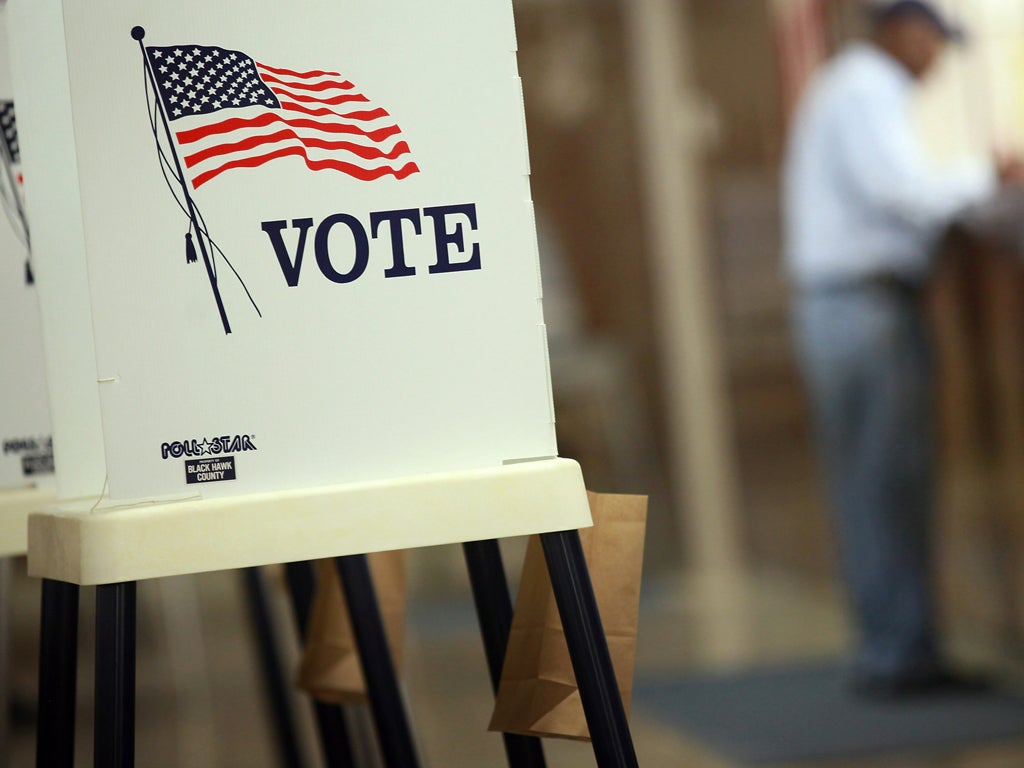Usborne in the USA: Alienated voters feel both parties are crossing the line
Congress and the country are looking less and less like each other and the country is noticing

More rotten tomatoes from Disgusted of Main Street. It’s not just Congress that Americans are fed up with – the main political parties are in dire odour too.
We know this from a Gallup survey showing that only 31 per cent of voters now call themselves Democrats, down five points since Obama was elected, while 25 per cent self-identified as Republicans, the lowest ever in a Gallup poll. The number labelling themselves independent rose to a record 42 per cent.
Tribes disintegrate when disenchantment sets in. Some of it has to do with the faltering recovery. But there is something else. The Republicans in particular have been deliberately distorting the democratic process as a means of clinging to power. Congress and the country are looking less and less like each other and the country is noticing.
Take the voter ID laws rammed through by multiple states recently in the name of curbing ballot-booth fraud. Really it’s about suppressing the participation of minority groups, who tend not to vote Republican. Vice President Joe Biden called it a “hail storm” assault against voters’ rights at a Martin Luther King breakfast this week. “Our opponents know the single most dangerous thing to give us is the right to vote.”
Partly we have the US Supreme Court to thank. Last June it struck down whole planks of the landmark 1965 Voting Rights Act. But it also has to do with the consolidation of power at the level of the states by Republicans. Today 36 states are under single-party rule, of which 23 are controlled from top to bottom by the GOP. You can do a lot when you have a legislative monopoly. Their favourite pastime: gerrymandering.
Redrawing the lines of congressional districts to reflect shifting populations after each 10-year national census is legitimate. But America is unique among advanced democracies in allowing politicians to do it (though a few states, including California, now delegate it to non-partisan bodies). The GOP has become especially adept at rigging the process in its favour. The trick is to a draw a map which concentrates voters for the other party in just a few misshapen districts while ensuring your party has a fighting chance in the rest.
Look what happened with North Carolina’s 13 congressional districts in the 2012 elections following a GOP redistricting. The state’s delegation to Washington was flipped from a 7-6 Democrat majority to 9-4 Republican. That might be normal but for this: 2,218,357 (50.6 per cent) North Carolinians had voted Democrat and 2,137,167 (48.7 per cent) had voted Republican. As Rob Christensen with Raleigh’s News & Observer notes: “This is the kind of election that only a Vladimir Putin or a Robert Mugabe would love.”
The skewing is also on view nationally. The GOP won a 234-to-201 majority in the House of Representatives in 2012 even though Democrats took 1.4 million more votes. Democrats are convinced that without the rigged redistricting they would be in control of the House. Imagine how different the last two years would have been: immigration reform and gun control laws, yes. Shutdowns, no.
The whole notion of leaders representing the people is under threat. Votes don’t count the way they should. Happily, there is some backlash. Voting rights groups are suing to have the lines in North Carolina overturned and are demanding reform elsewhere too. If the parties want respect again they had better listen.

Join our commenting forum
Join thought-provoking conversations, follow other Independent readers and see their replies